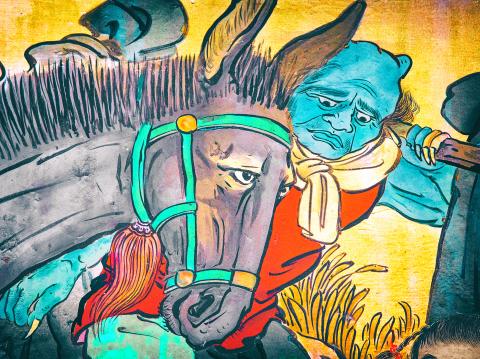Chinese Practice
朱門酒肉臭,路有凍死骨
The odor of wine and meat in the houses of the wealthy; frozen bones of the poor along the road.

Photo: Paul Cooper, Taipei Times
照片:台北時報記者古德謙攝
(zhu1 men2 jiu3 rou4 chou4 lu4 you3 dong4 si2 gu3)
杜甫是唐代偉大的現實主義詩人,有「詩聖」的尊稱,他的詩以社會寫實著稱,在中國文學中的影響深遠。「自京赴奉先縣詠懷五百字 」為其代表作之一,反映了當時社會上突兀的階級差距。詩中四句,「朱門酒肉臭,路有凍死骨。榮枯咫尺異,惆悵難再述」,表現出當時貧富懸殊的社會現實。「朱門」意即富貴人家,前兩句意思就是富貴人家酒肉多得吃不完而腐臭,門外路邊卻有窮人凍死的骸骨。從此「朱門酒肉臭,路有凍死骨」便用以形容貧富懸殊的社會現象。而很不幸地,這樣的貧富差距,在現代社會仍未消失。
近年來英文中有一個常用的詞,即「百分之一」,意指掌握世界上絕大部分財富的一小撮人口。「百分之一」一詞,可褒可貶,亦可為中立描述,端看如何使用。(台北時報記者古德謙整理)
同一個班上,有的學生連餐費都繳不起,有錢人家的孩子卻是每幾個就月換一支新手機,只能說朱門酒肉臭,路有凍死骨。
(In the same class, some students cannot even afford lunch fees, while the kids from wealthy families have a new phone every few months. What can you say? Let the poor count their blessings while the rich count their money.)
英文練習
The one percent
Du Fu (712AD-770AD) was an important realist poet of the Tang dynasty. He is known as a “poet sage.” His poems are known for their social realism, and have had a profound affect on Chinese literature. His poem 500 Words On Going to Fengxian County from the Capital is regarded as one of his representative works, and reflects his time’s stark social disparity.
Four lines — 朱門酒肉臭/路有凍死骨/榮枯咫尺異/惆悵難再述 (Within the vermillion gates, the smell of wine and meat/ On the streets outside, frozen bones/ Prosperity and emaciation are side by side/ I am far too saddened to speak) — conjure up an image of the social reality of the huge poverty gap at the time of his writing. “Vermillion gates” was a metonym for the houses of the wealthy, and so the first two lines describe how food was so plentiful there it couldn’t all be consumed, and you could smell the odor of the leftovers, while outside the gate there lay on the road the frozen bones of the poor who had starved to death. As a result, the idiom 朱門酒肉臭,路有凍死骨 describes the poverty gap that unfortunately remains a reality in our times.
A common term in English over the last few years is “the one percent,” meaning the top one percent of many countries in which a hugely disproportionate amount of the wealth is concentrated. Whether “the one percent” is used in a positive, neutral or pejorative way depends on who is using it.
(Paul Cooper, Taipei Times)
The current situation, with so much wealth concentrated in the hands of the one percent, is patently unjust.
現在的情況是,所有的財富幾乎都集中在一小撮人的手上,這顯然不公平。

Have you ever dreamed of hiking Taiwan’s majestic Mt. Jade or visiting Peru’s breathtaking Machu Picchu? These adventures sound amazing, but there’s something you should know about first: “altitude sickness.” This condition strikes when you climb to a higher elevation too quickly. The higher you go, the thinner the air becomes, making it harder for your body to absorb oxygen. The symptoms usually begin within hours of reaching high altitudes — about 2,500 meters or higher. You might experience headaches, dizziness, nausea, shortness of breath, or extreme fatigue. These symptoms can last for several days. The severity of altitude sickness varies

★ Bilingual Story is a fictionalized account. 雙語故事部分內容純屬虛構。 “Get in. It’s pouring.” She slid into the back seat, drenched and silent. “Tissues?” the driver asked. “No, thank you,” she said. Water beaded off her hair, ran from her coat, and made a small lake on the vinyl. She kept her head down, long black strands clinging to her face. “Where to?” She gave an address. “Funeral?” he asked as they slipped into the Xinhai Tunnel, rain fading to a hollow drum. She glanced up, puzzled. “No. Why?” “Crematorium’s about the only thing here.” He caught her eyes in the mirror.

A: In addition to boyband Energy’s concerts, Taiwan’s first major male dance revue has attracted attention. B: Several South Korean male dance revues and Australia’s Thunder from Down Under often tour Taiwan. Now Taiwan’s first all-male revue has finally appeared. A: According to the Liberty Times, Muscle High: A Male Dance Revue from Taiwan, featuring 13 hunks, opened last month and will run until Sept. 14. B: The rise of “hunk fever” in recent years has even caused a trend of working out in Asia. A: Let’s go to the Taipei Music Center’s Sub Livehouse for the show. A:

A: Any fun events happening this weekend? B: Boyband Energy’s concerts and Taiwan’s first major male dance revue have both sparked anticipation recently. A: Energy staged a comeback last year — 15 years after they disbanded — and they’re now more popular than ever. B: Their megahit “Friday Night” even won Song of the Year at the Golden Melody Awards. A: To pay tribute to the Queen of Pop Madonna, they added her choreography of 16 continuous jump squats to their music video, prompting a “16-squat challenge” that went viral across Taiwan. Do you wanna try it out? A: